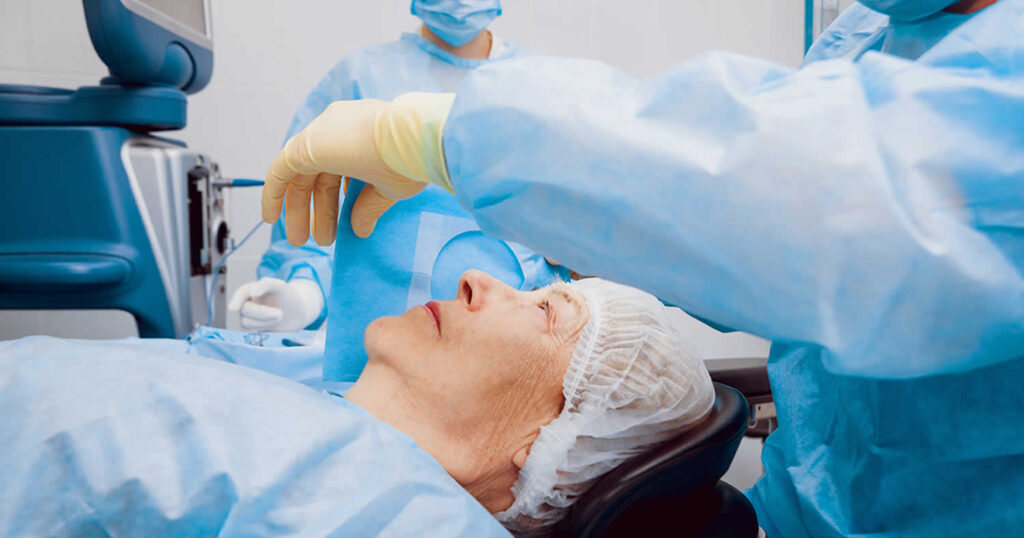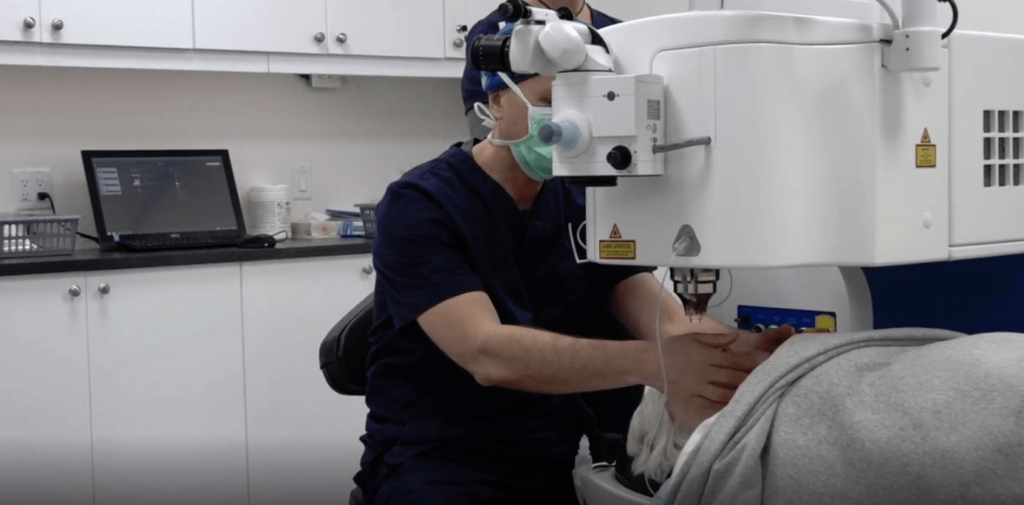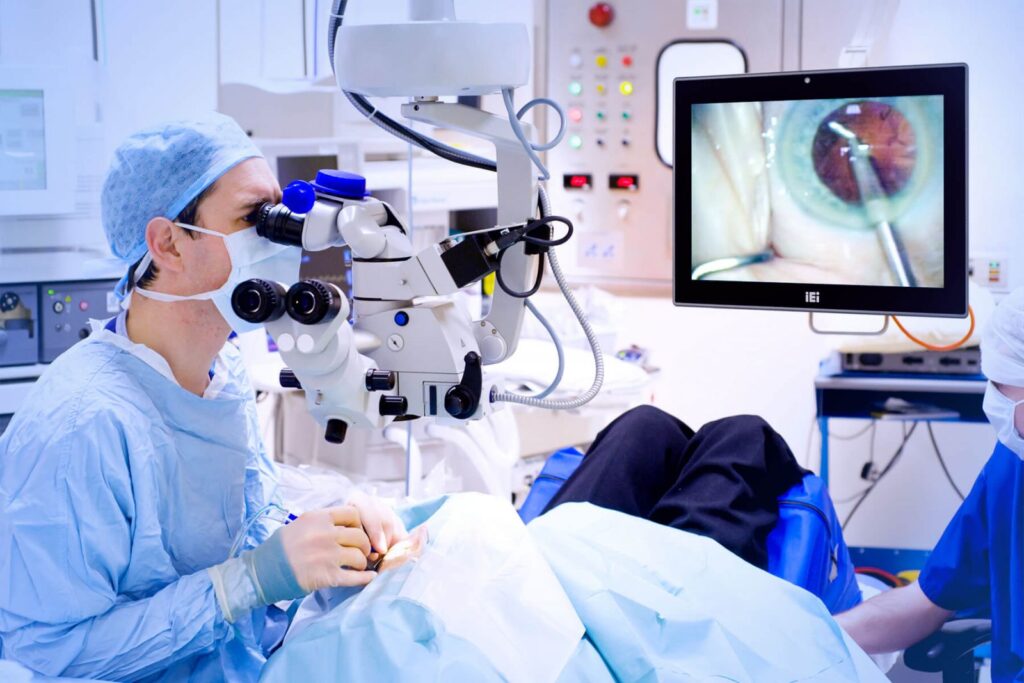Cloudiness in the eye’s lens, caused by a cataract, necessitates surgical intervention. A new lens is often installed. Since the process involves surgery, anaesthesia will be administered. Anesthesia is the drug used to numb the eye during cataract surgery so the patient does not experience any pain.
The majority of your cataract surgery will be performed while you are awake and under local anesthetic in the form of eye drops or a needle-based block due to the short duration of the surgery (often one hour or less). You might need to have general anesthesia or be given a sedative or other drug to help you relax in certain situations. Learn more about local anesthetic for undergoing cataract surgery.
Your doctor will give you specific advice on how to be ready for cataract surgery and anaesthesia.
The majority of people who undergo cataract surgery report positive outcomes. Consult your healthcare provider to learn more about the benefits you may experience.
See Also: Tips on How to Heal Faster After Cataract Surgery
Preparing for Cataract Surgery under Anesthesia
Cataract surgery is one of the most frequently done surgical operations. It takes only 15 minutes to do cataract surgery, and it may be done as an outpatient treatment. In cataract surgery, intraocular lenses are typically implanted with the use of lasers. There is little invasion due to the tiny incisions.

During surgery, patients receive anesthesia, a drug used to eliminate sensations of pain. Because cataract surgery is so brief and painless, just a little amount of anesthetic is used. Due of the success of local numbing techniques, general anesthesia is rarely used when dealing with eye problems.
Your doctor will numb the area around your eye, but you will remain awake during the procedure. Both oral and intravenous medicines are used to ensure your comfort and relaxation during this time.
Forms of Anesthesia Typically Used
Eye doctors can choose from a number of different anaesthetics while performing a cataract operation. You and your doctor will get to discuss your options and settle on the best course of action.
Cataract surgery, as well as other surgical procedures, often makes use of the following forms of anaesthesia: topical anaesthetic; eye block by needle; facial nerve block; or general anaesthesia.
Local anaesthetic is preferable if you are in generally excellent condition and can maintain your comfort and relaxation during the treatment. However, complete sedation is advised if you suffer from anxiety or a medical condition that causes restlessness.
General Anesthesia
General anaesthesia is sedation provided by a doctor that makes all your body unconscious (falling asleep for some period of time). When breathing becomes difficult, your doctor may insert a tube into your trachea. A doctor or anesthesiologist will keep an eye on your vitals (heart rate, blood pressure, breathing rate, etc.) during operation. And the painless slumber continues while you stay unconscious. The doctor will stop the anaesthesia and wake you up after the procedure is over.
After receiving anesthesia, some people may feel perfectly normal while others may endure a wide range of uncomfortable side effects. These negative effects of general anesthesia will be manageable with the guidance of your doctor.
Cataract surgery is best performed under general anaesthesia in very young children, those with special mental or emotional requirements, and adults with severe anxiety. They are able to rest easier during the surgery thanks to the sedatives.
Subcutaneous Nerve Blocks
The most common form of anaesthetic used is topical, followed by blocks administered through injection. It’s not uncommon for doctors to use both at once. Eye drops are used to numb the eyes before the procedure begins.
Your eye will be numbed by a drop that the doctor will administer. The doctor may also inject anaesthetic lidocaine into the orbit or the eye itself. It is commonly used after surgery to lessen or eliminate the patient’s discomfort.
Neurotomy of the Facial Nerves
A facial nerve block, sometimes called a trigeminal nerve block. The entire face is numbed with a needle. Only if there is a risk of problems during surgery would doctors recommend it. Face nerve blocks are also used for conditions such as Trigeminal Neuralgia, Herpes Zoster Infection, and other rare facial illnesses.
The trigeminal nerves are essential for facial movement and feeling. This nerve controls the muscles used in chewing, biting, and swallowing. If your nerve endings are cut off, you won’t experience any pain.

A Neural Blockage
The retrobulbar block, or needle-based eye block, is a form of regional or local anaesthetic. When doing intraocular or cataract surgery, it is necessary to inject the nerves. Anti-pain medication is injected into the retrobulbar space, which is located behind the eyeball.
As a result, the three cranial nerves that control the eyeball’s motion are blocked, leading to akinesia of the extraocular muscles. As a second mechanism of action, a needle-based eye block can be used to numb the cornea, uvea, and conjunctiva by acting on the ciliary nerves. Lidocaine and other injectable medications are also utilized in this method.
Medication for Anxiety Reduction during Cataract Surgery
You may be given medicine to help you unwind and keep you from being anxious during surgery. They are frequently given intravenously, intramuscularly, or orally. In addition to erasing all recollection of the operation, the dosage of these drugs is adjusted for each patient based on their height, weight, and general health. For general anaesthesia, however, the anesthesiologist will need to employ the smallest effective amounts of anaesthetic and relaxation drugs.
Post-Surgery Anaesthetic Effect
After an hour or two, the effects of the anaesthetic will wear off, and you’ll be able to go home. However, the effects of the medications might linger in your body for up to two days. Anesthesia’s numbing effects and general state of relaxation and comfort during surgery are two of its main advantages.
Anaesthetic Preparation
It is important to have thorough eye examination and specialised testing before cataract surgery so that the surgeon may select the best possible treatment options and medication regimen for you. Your current state of health and any preexisting conditions will be taken into consideration.
If you are concerned about your ability to remain still or awake, tell your doctor. A doctor’s job is to make sure you’re as relaxed as possible.
No food or liquids should be consumed after midnight on the day before surgery, and on the day of the procedure itself. Water is typically safe to consume. If your doctor prescribes any drugs, it is important to take them exactly as prescribed.
You’ll need to arrange for a ride home from the hospital after your operation. Cataract surgery is often performed rapidly and does not need a great deal of cutting or stitching, thus the necessary drugs are usually light and the recovery time is short.

